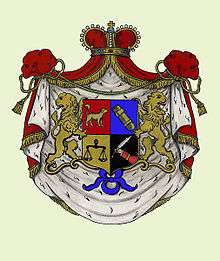Tumanishvili

The Tumanishvili (Armenian: Թումանյան; Georgian: თუმანიშვილი; Russian: Туманишви́ли), later Russianized as Toumanov or Toumanoff (Russian: Тума́нов) was a Georgian noble (tavadi) family of Armenian origin.[1]
History
The family has its roots in the ancient Armenian noble dynasty of the Mamikonians (Mamikonids),[2][3] One branch of the family, the Toumaniani, belonged to the Armenian Church; the other branch, the Toumanishvili, was Greek Orthodox.[4][5]
The two Mamikonid princely Houses of Georgia (and later the Russian Empire) are the Liparitids and the T’umanids. The former appeared in Iberia c. 876 and was invested with the office of High Constable of Georgia. It returned, to Armenia in 1177, or possibly even earlier and reigned as the Third Dynasty of Siunik from c. 1200 to the mid-fifteenth century. The other house of T’umanids, moved back to Georgia from Cilicia after the twelfth century and adopted the last name Toumanishvili.[6] They were acknowledged by the Kings of Georgia as tavadi (princes), and received hereditary rank as the King's "mdivanbeg" (counselor or vizier).
The Tumanishvili family was on the list of Georgian princes that was attached to the Treaty of Georgievsk concluded with the Georgian King Erekle II on July 24, 1783 and on recognized on the Russian Empire's list of princely families in December 1850.[7]
See also
References
- ↑ Journal of the Society for Armenian Studies, Volumes 7-8. 1994. Page 5
- ↑ Journal of the Society for Armenian Studies, Volumes 7-8. Society for Armenian Studies. The Society, 1994. Page 5 "Cyril Leo Heraclius Toumanoff was born in St. Petersburg, Russia, the descendant of an old Armeno-Georgian family long settled in Georgia. Though the Toumanoffs (Georgian: Toumaniani for the branch of the House that remained true to the Armenian Church; Toumanishvili for the Greek Orthodox line), he was descended from a Mamikonian noble, Prince Tuman, who, ca. 1250, migrated from the Cilician Armenian Kingdom to Georgia and there acquired the lordship of Kheltubani, an estate just north of the town of Gori. By the fourteenth century, the family had acquired the hereditary protonotoryship of the kingdom of Georgia, a position held collectively by all male members of the house until the end of the Georgian monarchy"
- ↑ John W. Barker. Pioneers of Byzantine studies in America. Byzantinische Forschungen (Volume 27). Adolf M. Hakkert, 2002. Page 232
- ↑ Pioneers of Byzantine studies in America. John W. Barker, 2002, P. 231-
- ↑ Journal of the Society for Armenian Studies, Volumes 7-8. 1994. Page 5.
- ↑ Cyril Toumanoff, (en) Studies in Christian Caucasian History (Georgetown University Press, 1963), pp. 209; 212, n. 238.
- ↑ Любимов С.В. Титулованные роды Российской империи: Опыт подробного перечисления всех титулованных российских дворянских фамилий, с указанием происхождения каждой фамилии, а также времени получения титула и утверждения в нем / Гос. публ. ист. б-ка России. – М.: ФАИР-ПРЕСС, 2004. с. 368